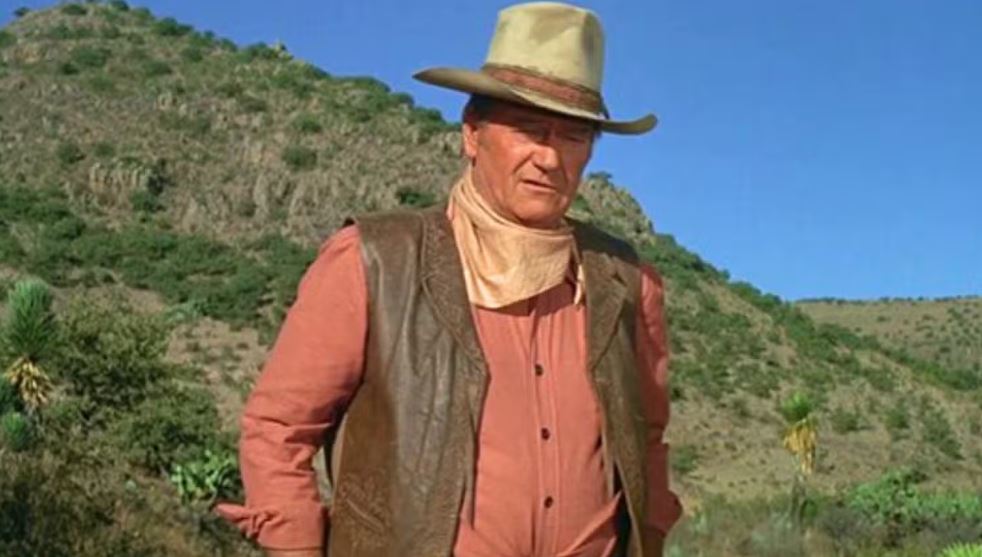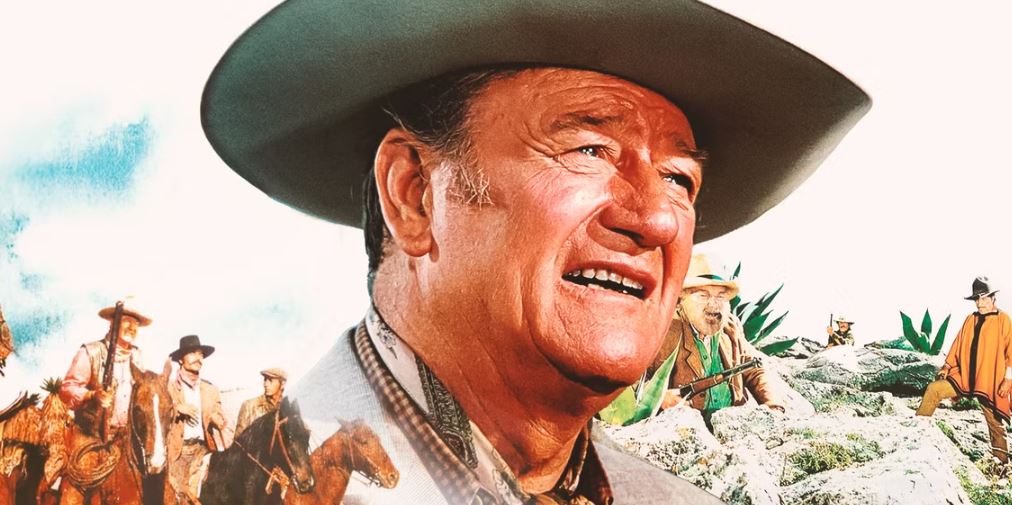Violence and the Western genre often go hand-in-hand, but not every horse opera is an excessive mess of blood, guts, and gore. In general, John Wayne pictures are pretty lax when it comes to violence. Even though gunshots reign supreme in most of the Duke’s Westerns, they rarely feel as bloody or violent as the films of Sam Peckinpah, Clint Eastwood, or Quentin Tarantino. But in Wayne’s later years, the Western star was a bit more willing to get downright gruesome, particularly in his 1971 offering, Big Jake. While not on the same level as some of the aforementioned director’s films, this Western outing — where the Duke plays Jacob “Big Jake” McCandles — surprised even critics with its unforgiving displays of violence.
‘Big Jake’ Is John Wayne at His Most Volatile
Though perhaps not as well-known as Stagecoach, as dramatic as The Searchers, or as notable as True Grit, Big Jake is a Western that’s got plenty of character. With a stellar cast that includes the Duke’s son, Patrick Wayne, as Big Jake’s trigger-happy son James, Have Gun — Will Travel star Richard Boone as black hat John Fain, and Maureen O’Hara in her final role opposite Wayne (and her last theatrical appearance until 1991’s Only the Lonely), the 1971 Western is a grand display of cowboy prowess and classical appeal. Though it was made at a time when spaghetti Westerns were terribly popular and revisionist Westerns were on the rise, Big Jake feels like a classic John Wayne picture, even if it comes near the tail-end of his career. However, compared to some of Wayne’s previous period dramas, this one has an unmistakable taste for violence.

Considering that Big Jake takes place not in the 1800s, but in the 20th century, its meditations on the aggressive expansion of technological progress and the fading of the iconic American West lead to some necessary dialogue about the role of violence in this new century. The titular Jake himself has been isolated from his family due to his more classical approach to Western living (and frequent lovers), while his wife, Martha (O’Hara), has continued to expand and grow their cattle operation without him. There’s a clear distinction here between the civilization that Martha belongs to and the wilderness that Jake has chosen over his family, at least until civilization is no longer enough. When Fain’s men kidnap Jake’s grandson, Little Jake (played by the Duke’s youngest child, Ethan Wayne), progress will not help against outlaws such as these. Only the old Western ways will do.
Because of that, Big Jake is chock-full of excessive (well, excessive for the Duke) melee, which includes far more blood than is usual in a John Wayne picture. Of course, Big Jake will never be considered one of the most violent Westerns of all time, but, especially in its day, it was a staggering departure from what audiences were used to from the Duke. Indeed, while the film alternates between bloody and bloodless gunshot wounds, there’s quite a bit of fighting here, even between our heroes. Though, perhaps the most obvious bit here comes at the end of the picture, when John Wayne’s Big Jake kills a man (Gregg Palmer) with a pitchfork. It’s not quite as bloody as Little Jake’s use of the same weapon near the beginning of the film (which nearly takes out Glenn Corbett’s Breed O’Brien, leaving him with a nasty scar), but it’s shockingly effective.
Critics Considered ‘Big Jake’ a Violent Departure for John Wayne

At the time, Big Jake stunned audiences and critics for its forays into more violent Western territory. For an actor who had built his entire Hollywood brand on being a “family friendly” hero (even though many of his characters are far from that), this ’71 flick had the opposite effect. At the time, Variety called Big Jake “gratuitously violent far beyond the legitimate requirements of the action plot.” The Chicago Tribune echoed these sentiments, noting that, “the most obvious excess, and this is unusual for a John Wayne film, is violence.” Even so, reviewer Gene Siskel deemed it one of Wayne’s recent best.
What’s especially interesting about this is that John Wayne himself detested violence in motion pictures. In a now-infamous 1971 interview with Playboy, he condemned Sam Peckinpah’s The Wild Bunch for that very reason. “Pictures go too far when they use that kind of realism,” the Duke elaborated, “when they have shots of blood spurting out and teeth flying…” Ironically, Big Jake does contain a few shots of blood at the beginning, though nowhere near as graphically as Peckinpah’s movies. While much of the violence in Big Jake is on the part of the villains, the Duke has his own hand in it as well. If you haven’t seen this Western quite yet, then it’s about time.
